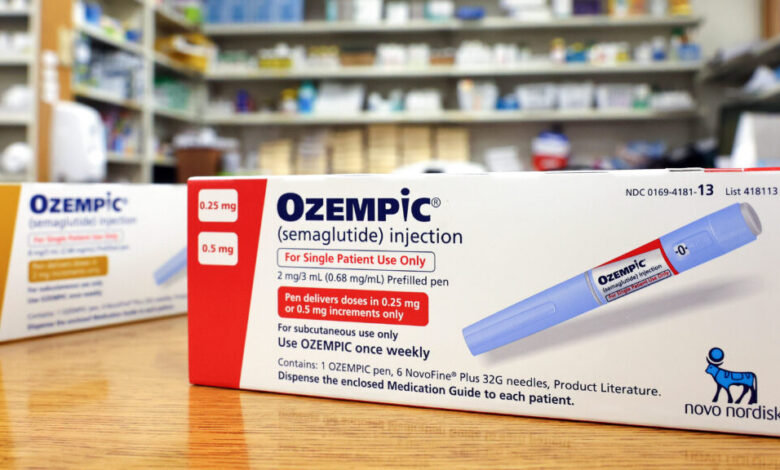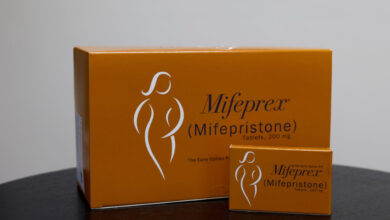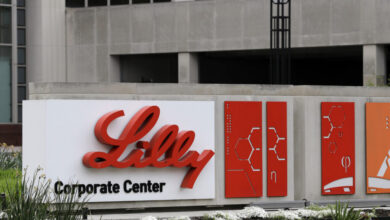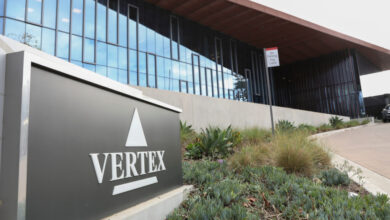Pfizer, Johnson & Johnson, Walmart, Ozempic

Want to stay on top of the science and politics driving biotech today? Sign up to get our biotech newsletter in your inbox.
Good morning, I highly recommend reading this investigation STAT published today on a research project at Mount Sinai in which doctors have been taking biopsies of living patients’ brains, sparking alarm at the FDA.
And please take a second to share your feedback on this newsletter in our survey. Now, onto the biotech news.
The need-to-know this morning
- Pfizer reported first-quarter earnings and slightly raised its profit outlook for the remainder of the year. Revenue guidance remained unchanged.
- Johnson & Johnson offered a new proposal to pay $6.5 billion to settle thousands of lawsuits alleging its baby powder and other talc-containing products caused ovarian cancer.
FTC cracks down on Ozempic’s ‘junk’ patents
The Federal Trade Commission is broadening its campaign to curb alleged patent abuses by the pharmaceutical industry, disputing over 300 patent listings across 20 drugs, including Novo Nordisk’s blockbuster diabetes drug Ozempic.
Drug companies have increasingly been accused of filing improper or inaccurate patents to make it harder for generic companies to sell lower-cost alternatives, thereby extending their monopolies. Under current rules, if a brand-name company sues a generic rival for infringing on a patent, the FDA is automatically barred from approving the generic drug for 30 months. So brand-name companies have an incentive to list more patents, whether valid or not.
A study published two months ago had suggested the FTC may want to scrutinize the patents listed for the injector pens that Ozempic comes in. “Brand-name firms appear to be using these device patents as part of a strategy to delay competition,” one of study’s authors said.
Read more from STAT’s Ed Silverman on which other drugs and devices the FTC targeted.
Dark days for a once-hyped video game treatment
Akili Interactive made waves in 2020 for securing approval to sell a video game to treat ADHD, but the treatment has seen sluggish sales as it’s failed to gain traction with insurers and patients.
The company is now laying off 46% of its staff and evaluating strategic alternatives, it said yesterday. This comes after another round of big layoffs Akili had made last year that reduced its workforce by 40%.
It’s been a dismal period for digital therapeutic companies. Earlier this year, Better Therapeutics, which made an app to treat type 2 diabetes, shut down operations. And almost exactly a year ago, Pear Therapeutics sold off its assets at bankruptcy auction.
Read more from STAT’s Mario Aguilar on the fate of the company.
Starting age for mammograms lowered to 40
The U.S. Preventive Services Task Force lowered the recommended age for all women to start breast cancer screening from 50 to 40 years old, in part because breast cancer rates are rising among younger women.
Cancer screening recommendations are tricky since they need to balance the benefits of catching cancer early against potential harms. Such harms include unnecessary biopsies in false positive cases and overdiagnoses (diagnoses of tumors that grow so slowly they wouldn’t have harmed or killed the patient). Screening more, such as expanding the age range eligible for screening, often helps to save lives but at the cost of additional harms.
In this case, members of the task force felt that lowering the screening age to start at 40 was well worth the trade-off. They project the move could save an additional 1.3 lives out of every 1,000 people.
Read more from STAT’s Angus Chen on why the task force made this change and what other experts think of it.
‘Skinny labels’ saved Medicare a lot of money
Skinny labelling is when drugmakers get approval for a generic or biosimilar medicine for a specific use and not for any other patented uses for which the brand-name drug is prescribed.
This practice can be traced back to a decades-old law designed to bring more cheaper generics on the market, and, as it turns out, the law achieved its desired effect. A new analysis found that skinny labeling has saved Medicare Part D $15 billion on just 15 medicines from 2015 to 2021.
Researchers found that the skinny label generics generated competition sooner than if they hadn’t been available, and the use of these generics was higher than what might have otherwise occurred without skinny label alternatives.
Read more from Ed on the details of the new study.
More reads
- In a big reversal, Walmart to shut down medical clinics and online care, STAT
- Bristol Myers, Johnson & Johnson plot appeal after US judge dismisses IRA lawsuits, Fierce Pharma
- Justice Department will move to reclassify marijuana in a historic shift, AP sources say, AP
- Opinion: Creating the next wave of antibody therapies requires innovative collaboration, STAT



